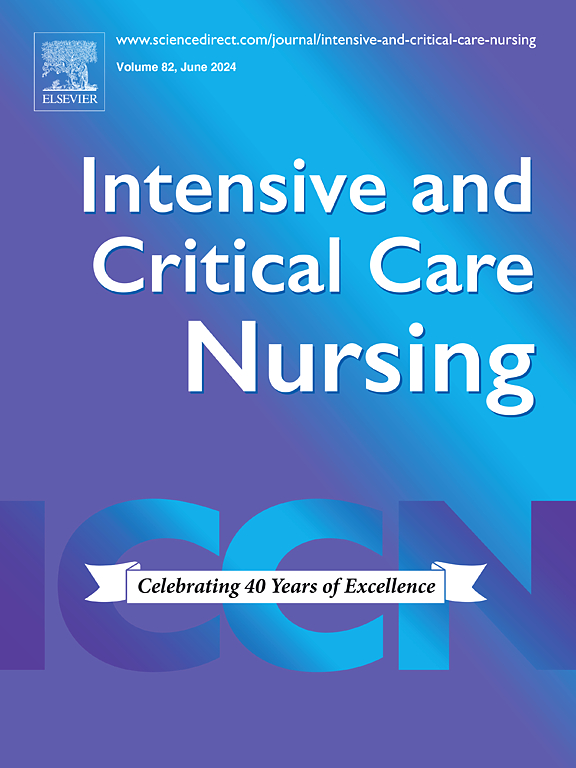Determinants of digital ICU diary implementation and use by ICU professionals: A cross-sectional survey analysis
IF 4.9
2区 医学
Q1 NURSING
引用次数: 0
Abstract
Objectives
To identify the key determinants for implementing and utilizing a digital intensive care unit (ICU) diary among ICU professionals.
Background
Despite the advantages of digital diaries over traditional paper ones, their implementation presents challenges that necessitate tailored strategies considering the influencing factors.
Design
A multicentre, cross-sectional survey study.
Methods
A self-developed questionnaire was administered from March to May 2023, targeting ICU professionals across four hospitals in the Netherlands. Participants rated the relevance of 34 determinants on a 5-point Likert scale across four domains: (1) Digital diary introduction and use, (2) Education and information dissemination, (3) Offering the digital diary to patients’ relatives, and (4) Professionals’ engagement in diary writing.
Results
Responses were received from 214 professionals. The most commonly agreed-upon determinants promoting implementation were seamless accessibility (n = 200; 93.5 %), enthusiastic and motivating champions (n = 190; 88.8 %), and comprehensive information and education (n = 184; 86 %). The preferred method for disseminating information was direct instruction from champions in the teams (n = 194; 90.7 %). Promoting factors for providing digital diaries to relatives included understanding its utility (n = 203; 94.9 %) and recognizing its added value (n = 193; 90.2 %). Additionally, 132 professionals (61.7 %) expressed a positive attitude towards co-writing the digital diary.
Conclusion
This study identified key determinants promoting the implementation and utilization of digital diaries in ICUs among professionals. These findings lay a foundation for developing strategies to address challenges and enhance the successful implementation of digital diaries in ICU settings.
Implications for clinical practice
To maximize the impact of digital diaries, it is essential to involve end users early and tailor the design for ease of use. Selecting influential champions is key, and they should receive training to lead and mentor others. Clear communication of the benefits for patients and families will foster professionals’ understanding and motivation, ultimately enhancing patient care.
数字ICU日记实施和ICU专业人员使用的决定因素:横断面调查分析。
目的:确定在ICU专业人员中实施和使用数字重症监护病房(ICU)日记的关键因素。背景:尽管数字日记比传统的纸质日记有优势,但它们的实施面临挑战,需要考虑到影响因素的量身定制策略。设计:多中心横断面调查研究。方法:于2023年3月至5月对荷兰四家医院的ICU专业人员进行自行开发的问卷调查。参与者在5点李克特量表上对四个领域的34个决定因素的相关性进行了评级:(1)数字日记的介绍和使用,(2)教育和信息传播,(3)向患者亲属提供数字日记,以及(4)专业人员参与日记写作。结果:收到214名专业人士的回复。促进实施的最普遍商定的决定因素是无缝可及性(n = 200;93.5%),热情和激励的冠军(n = 190;88.8%),综合信息教育(n = 184;86%)。传播信息的首选方法是来自球队冠军的直接指导(n = 194;90.7%)。向亲属提供数字日记的促进因素包括了解其效用(n = 203;94.9%)并承认其附加值(n = 193;90.2%)。此外,132名专业人士(61.7%)对共同撰写数字日记持积极态度。结论:本研究确定了促进icu专业人员实施和利用数字日记的关键决定因素。这些发现为制定应对挑战的战略奠定了基础,并提高了ICU环境中数字日记的成功实施。对临床实践的影响:为了最大限度地发挥数字日记的影响,尽早让最终用户参与进来,并为易用性量身定制设计是至关重要的。选择有影响力的拥护者是关键,他们应该接受领导和指导他人的培训。清晰的沟通对病人和家属的好处将促进专业人员的理解和动力,最终提高病人的护理。
本文章由计算机程序翻译,如有差异,请以英文原文为准。
求助全文
约1分钟内获得全文
求助全文
来源期刊

Intensive and Critical Care Nursing
NURSING-
CiteScore
6.30
自引率
15.10%
发文量
144
审稿时长
57 days
期刊介绍:
The aims of Intensive and Critical Care Nursing are to promote excellence of care of critically ill patients by specialist nurses and their professional colleagues; to provide an international and interdisciplinary forum for the publication, dissemination and exchange of research findings, experience and ideas; to develop and enhance the knowledge, skills, attitudes and creative thinking essential to good critical care nursing practice. The journal publishes reviews, updates and feature articles in addition to original papers and significant preliminary communications. Articles may deal with any part of practice including relevant clinical, research, educational, psychological and technological aspects.
 求助内容:
求助内容: 应助结果提醒方式:
应助结果提醒方式:


